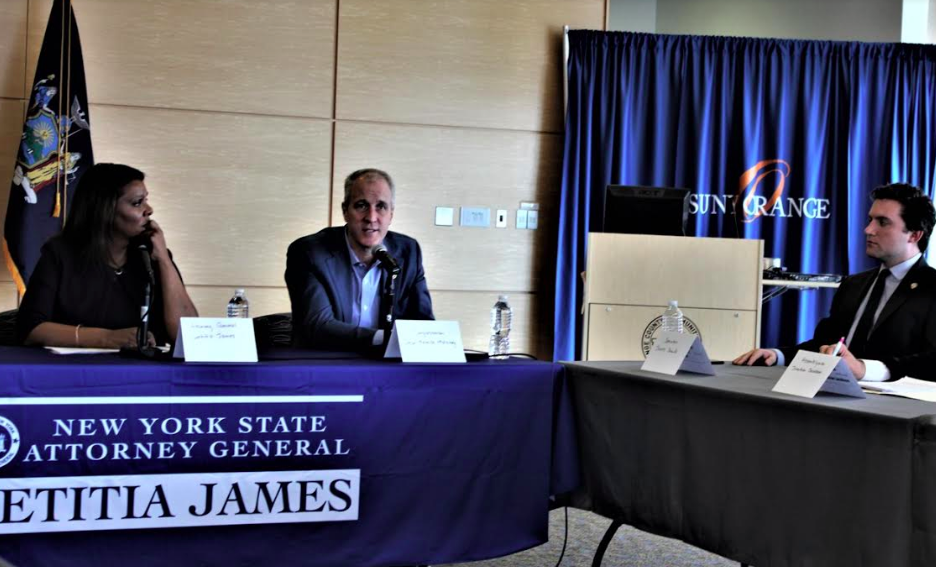 Story and Photos
Story and Photos
By Kathy Kahn
Most know what OxyContin and its derivatives, including oxycodone and fentanyl, can easily hook the user, who are initially prescribed opioids for “pain management,” taking them into the downward spiral of addiction. The companies that make the painkillers-among them Purdue Pharmaceuticals, Rhodes Pharmaceuticals, Adion Therapies, Napp Pharmaceuticals –are primarily owned and operated by members of the Sackler family, who bought Purdue Pharmaceuticals in 1952 that has become a worldwide money-making producer and distributor of these mind-numbing medications Attorney General Letitia James came to Newburgh on Saturday, April 6, meeting with U.S. Rep. Sean Patrick Maloney, NYS Senator James Skoufis, a panel of non-profits who work to help treat those whose lives have been eaten away by addiction to the “remedies” Purdue and the other companies under its shadowy umbrella.
New York is joining 38 other states who are suing the company, and AG James said New York “is well aware this addiction is affecting thousands of New Yorkers. We have filed the most extensive lawsuit against Purdue Pharmaceuticals and members of the Sackler family, who own the company and who produce and distribute these drugs. It doesn’t matter what color you are, how much you make or where you live—it is affecting us in all levels of society, a curse that affects every community.”
One of the sticking points is the millions of dollars in taxes opioid manufacturers pay—but the payment also comes with a cost to society as a whole. ´We need change the law and to take on the pill pushers, said Skoufis. “This is a bi-partisan problem with no room for divisiveness—we all have to work together on this.”
Non-profit executives that work with addiction, recovery and support say there is a need for a more cohesive way to treat the whole addiction process, which can often be piecemeal. The need for recovery/rehabilitation centers and aftercare do not have the financial means to address all the problems in a more cohesive manner.
 Many who become addicted to painkillers often start taking them after surgery—as did Adrienne Voltaire from the Town of Highlands, who now works for Independent Living. Surgery found her with a prescription for oxycodone. “I was in denial that I was an addict,” said Voltaire. The reality hit her when she was arrested and ended up in jail. “That definitely was the wake-up call that I was an addict, not just someone who took too many pills.”
Many who become addicted to painkillers often start taking them after surgery—as did Adrienne Voltaire from the Town of Highlands, who now works for Independent Living. Surgery found her with a prescription for oxycodone. “I was in denial that I was an addict,” said Voltaire. The reality hit her when she was arrested and ended up in jail. “That definitely was the wake-up call that I was an addict, not just someone who took too many pills.”
Many now sitting in county jails are there for addiction, but jails, despite best attempts, cannot handle the addiction crisis either by cross-training guards to act in a medical or mental health capacity. Most felt there needed to be an “alternative to incarceration” for those who are struggling with addiction, since jails “are meant for violent criminals who are a danger to the community.” said Orange County Undersheriff Ken Jones.
Cornerstone Family Health in Newburgh is the only place in Orange County for methadone users to get dosed. Executive Director Linda Muller said more than 1,400 people receive methadone through Cornerstone, “but we need other facilities. These are people who go to work just like we do. They are not homeless, jobless and many have families to take care of and support. But it’s difficult for us to get any satellite locations…most people do not want a methadone center in their neighborhoods.”
The City of Newburgh’s new Mayor, Torrance Harvey, also a teacher at the Newburgh Free Academy, said he sees “both sides of the problem. Our children live in the age of the World Wide Web. They are exposed in so many innovative ways to get high. Vaping is becoming a big problem.” When asked if Newburgh would opt out of letting recreational marijuana be sold in the city, Harvey declined to comment—since Newburgh also has a large population of people who use marijuana.
Social workers and others said the public needs to be educated the way it was done in anti-tobacco campaigns—but that needs funding, and two cents out of each dollar is not enough to bring about a change.
Former school teacher and Child Protective Services Investigator, Adrienne Voltaire, who said her family had a pre-disposition to addiction, became an addict herself after she had back surgery. “It’s a stigma. I kept my problem quiet until I could not do it anymore—and I ended up in handcuffs.” As a graduate of Drug Court, she says it helped her to reset her life. “Doesn’t matter how educated you are or how much money you have, it took a huge toll on my family and publicly humiliated me. I felt like a moral failure. It’s time to give a different ‘face’ to addiction.”
One caveat to the multiple lawsuits: Purdue Pharma may declare bankruptcy. Last month, it paid $270 million to Oklahoma, and the new plethora of lawsuits may make them think twice about continuing in business. “As the company has stated, it is exploring and preparing for any number of eventualities and options, given the amount of litigation the company currently faces,” Purdue Pharma spokesman Robert Josephson said in an email to The Associated Press. “A decision has not been made to file for bankruptcy, nor is there a timetable.”

You must be logged in to post a comment Login